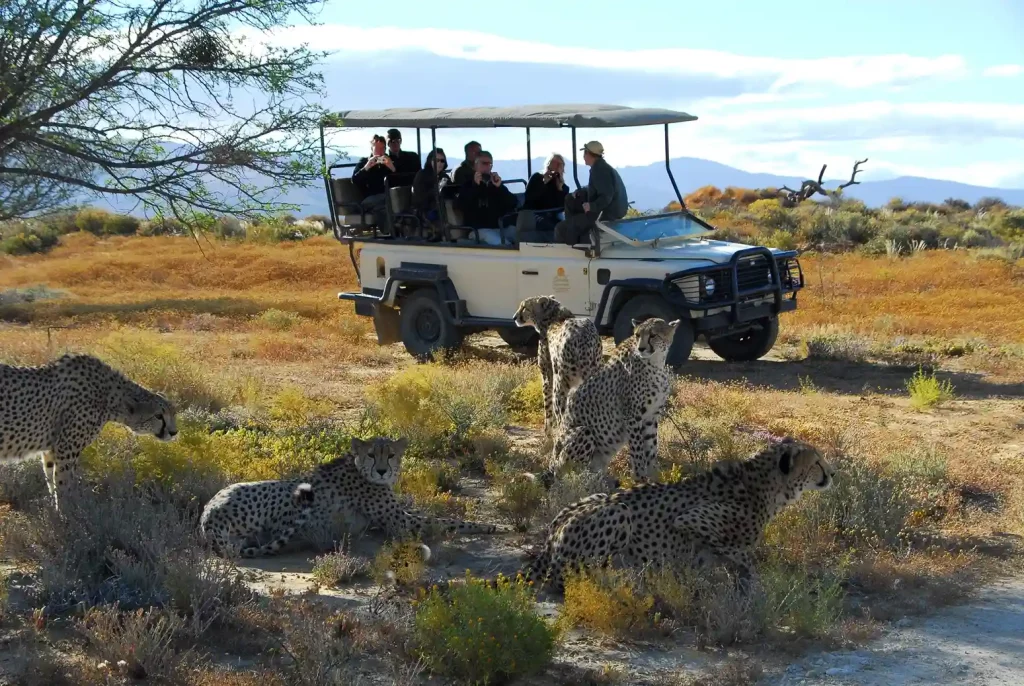Menu
Inverdoorn Private Game Reserve is leading the way for responsible tourism and wildlife conservation in South Africa by implementing a new cheetah rehabilitation model and ethics committee. This new model focuses on animal welfare, conservation effectiveness, and sustainability. The ethics committee provides independent oversight and guidance to ensure that the reserve’ve wildlife programmes and educational experiences are meeting ethical obligations. Following the success of the new cheetah conservation initiative and recent committee feedback, we are hopeful that other wildlife rehabilitation programmes will follow Inverdoorn’s lead and adopt similar standards, maximising the chances of endangered or captive-bred animals being successfully released back into the wild.
In 2018, shortly after acquiring Inverdoorn Private Game Reserve, Searl Derman, the visionary behind the Aquila Collection, made a groundbreaking announcement. He declared the implementation of a wildlife ethics committee as well as an immediate and strict “no-touch policy”. This bold move was motivated by the existing monetised cheetah programme, which included various forms of cheetah interactions and captivity-led experiences. In response, Inverdoorn’s newly established staff embarked on a mission to collaborate with industry and conservation partners, leading to the establishment of an independent Ethics Committee to oversee and establish.
The Ethics Committee is comprised of industry experts committed to wildlife welfare and conservation:
The committee wasted no time in inspecting Inverdoorn’s Cheetah Conservation project. Their findings shed light on the commitment to ethical practices and animal welfare at the reserve:
Animal Welfare: The committee confirmed that there were 15 cheetahs in captivity, all well cared for by experienced and dedicated handlers. These animals enjoy an excellent quality of life, ensuring their good health and well-being.
Rehabilitation Process: As part of the rehabilitation process, the cheetahs engage in a unique exercise regimen. They are enticed to chase a lure at speeds of up to 120 km/h. At the end of their sprint, they are rewarded with food. Guests are allowed to observe this activity from a safe vantage point. This exercise is both stimulating and essential for maintaining the cheetahs’ physical and mental health while encouraging their natural hunting instincts.
Habitat and Interaction: The holding camps for the captive-bred cheetahs are spacious and maintained in impeccable condition. Moreover, the cheetahs are taken into the veld (open grasslands) every morning or evening, where they can roam freely, mimicking their natural habitat.
Educational Initiatives: In place of direct interaction, guests are now offered a comprehensive conservation educational tour. This proactive approach aims to raise awareness about cheetah conservation and provides visitors with an enriching experience.
Cheetah Rehabilitation Project: Inverdoorn’s Cheetah rehabilitation programme is also working towards releasing all captive-bred cheetahs back into the wild. The cheetah breeding initiative and cheetah run exercise form part of the many initiatives reserve staff have implemented in an effort to re-establish Inverdoorn’s thriving wild cheetah population once more.

Inverdoorn Private Game Reserve, under the vigilant oversight of the Ethics Committee, has set an exemplary standard for ethical wildlife management. The committee’s assessment affirms that the cheetahs at Inverdoorn are among the “luckiest captive cheetahs in South Africa”, thanks to their exceptional living conditions, expert care, contentment, and quality of life enhancement programmes. Inverdoorn’s cheetah conservation success serves as a model for others in the field of wildlife conservation, emphasising the importance of ethical practices, animal welfare, and responsible tourism.

Copyright© Aquila Collection. Inverdoorn Private Game Reserve is part of the Aquila Collection.